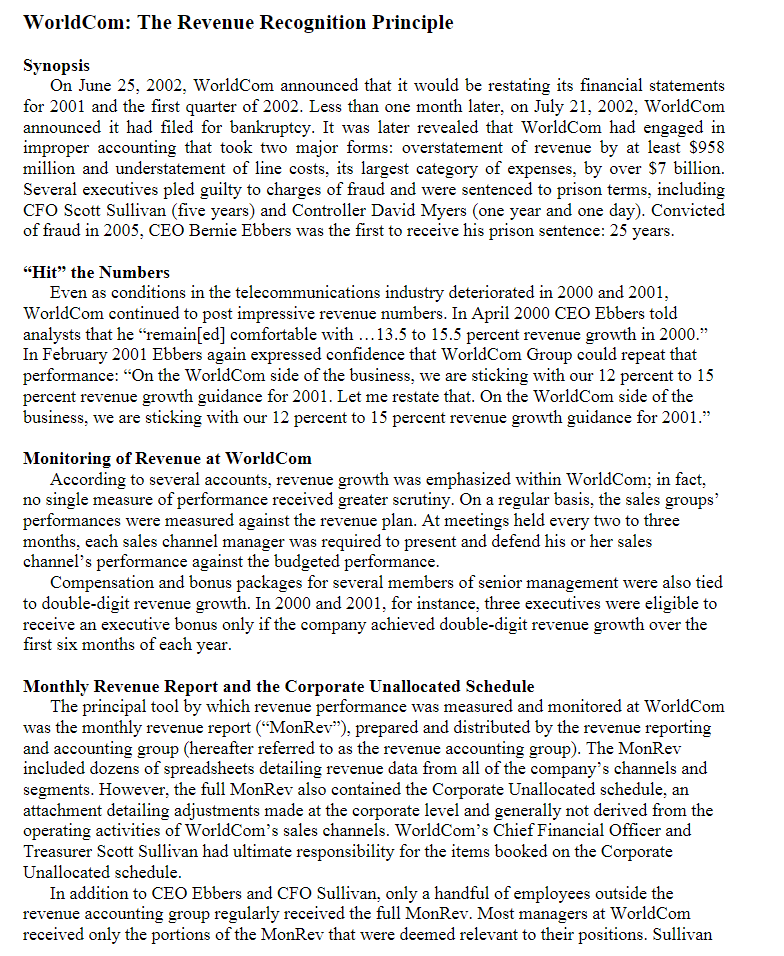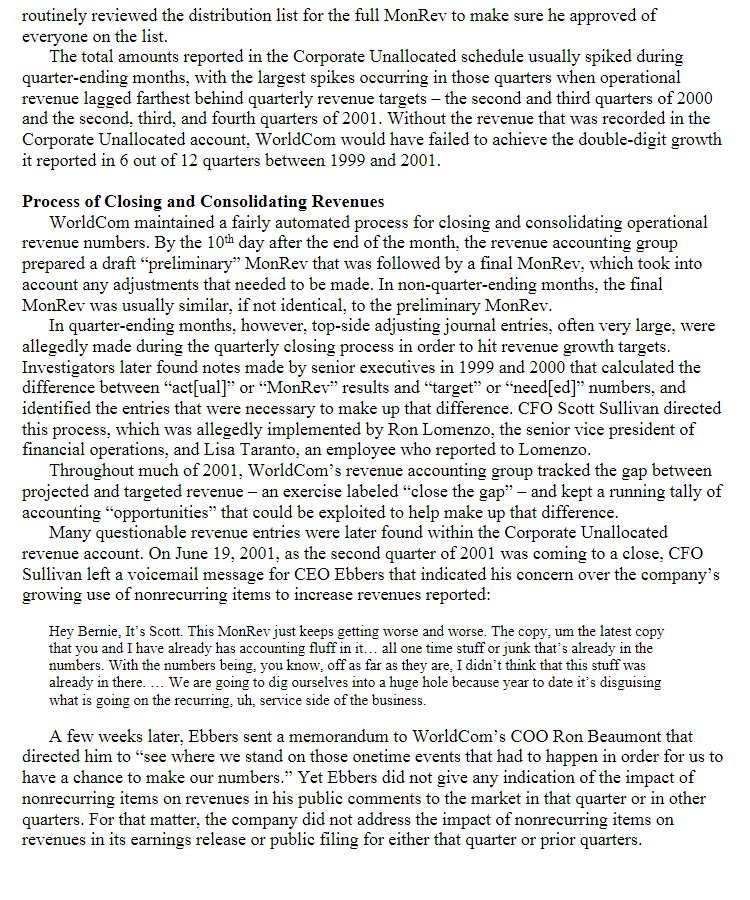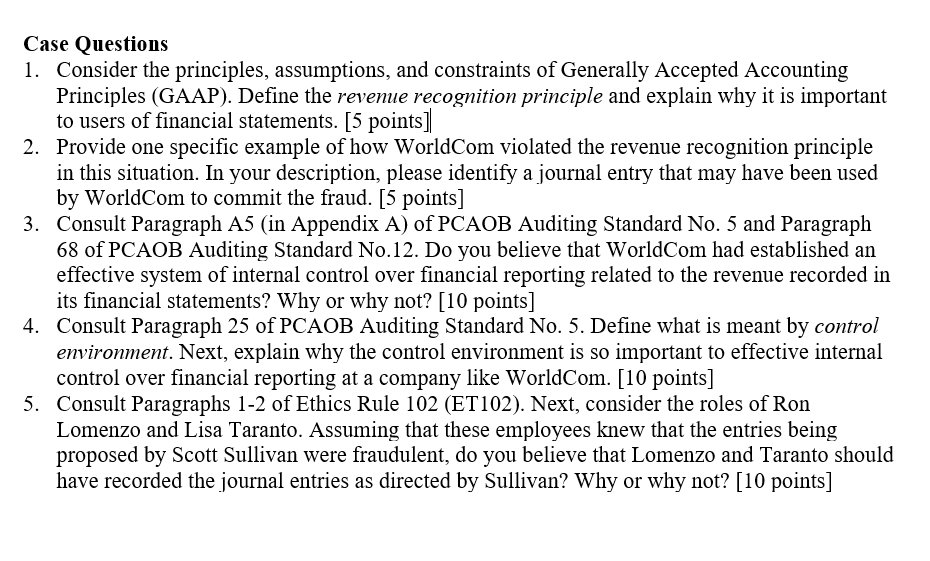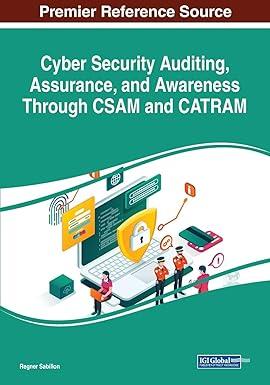


WorldCom: The Revenue Recognition Principle Synopsis On June 25, 2002, WorldCom announced that it would be restating its financial statements for 2001 and the first quarter of 2002. Less than one month later, on July 21, 2002, WorldCom announced it had filed for bankruptcy. It was later revealed that WorldCom had engaged in improper accounting that took two major forms: overstatement of revenue by at least $95:8 million and understatement of line costs, its largest category of expenses, by over $7 billion. Several executives pled guilty to charges of fraud and were sentenced to prison terms, including CFO Scott Sullivan (five years) and Controller David Myers (one year and one day). Convicted of fraud in 2005, CEO Bernie Ebbers was the first to receive his prison sentence: 25 years "Hit" the Numbers Even as conditions in the telecommunications industry deteriorated in 2000 and 2001 WorldCom continued to post impressive revenue numbers. In April 2000 CEO Ebbers told analysts that he "remain[ed] comfortable with ...13.5 to 15.5 percent revenue growth in 2000." In February 2001 Ebbers again expressed confidence that WorldCom Group could repeat that performance: "On the WorldCom side of the business, we are sticking with our 12 percent to 15 percent revenue growth guidance for 2001. Let me restate that. On the WorldCom side of the business, we are sticking with our 12 percent to 15 percent revenue growth guidance for 2001. Monitoring of Revenue at WorldCom According to several accounts, revenue growth was emphasized within WorldCom; in fact, no single measure of performance received greater scrutiny. On a regular basis, the sales groups' performances were measured against the revenue plan. At meetings held every two to three months, each sales channel manager was required to present and defend his or her sales channel's performance against the budgeted performance Compensation and bonus packages for several members of senior management were also tied to double-digit revenue growth. In 2000 and 2001, for instance, three executives were eligible to receive an executive bonus only if the company achieved double-digit revenue growth over the first six months of each year Monthly Revenue Report and the Corporate Unallocated Schedule The principal tool by which revenue performance was measured and monitored at WorldCom was the monthly revenue report ("MonRev"), prepared and distributed by the revenue reporting and accounting group (hereafter referred to as the revenue accounting group). The MonRev included dozens of spreadsheets detailing revenue data from all of the company's channels and segments. However, the full MonRev also contained the Corporate Unallocated schedule, an attachment detailing adjustments made at the corporate level and generally not derived from the operating activities of WorldCom's sales channels. WorldCom's Chief Financial Officer and Treasurer Scott Sullivan had ultimate responsibility for the items booked on the Corporate Unallocated schedule In addition to CEO Ebbers and CFO Sullivan, only a handful of employees outside the revenue accounting group regularly received the full MonRev. Most managers at WorldCom received only the portions of the MonRev that were deemed relevant to their positions. Sullivan WorldCom: The Revenue Recognition Principle Synopsis On June 25, 2002, WorldCom announced that it would be restating its financial statements for 2001 and the first quarter of 2002. Less than one month later, on July 21, 2002, WorldCom announced it had filed for bankruptcy. It was later revealed that WorldCom had engaged in improper accounting that took two major forms: overstatement of revenue by at least $95:8 million and understatement of line costs, its largest category of expenses, by over $7 billion. Several executives pled guilty to charges of fraud and were sentenced to prison terms, including CFO Scott Sullivan (five years) and Controller David Myers (one year and one day). Convicted of fraud in 2005, CEO Bernie Ebbers was the first to receive his prison sentence: 25 years "Hit" the Numbers Even as conditions in the telecommunications industry deteriorated in 2000 and 2001 WorldCom continued to post impressive revenue numbers. In April 2000 CEO Ebbers told analysts that he "remain[ed] comfortable with ...13.5 to 15.5 percent revenue growth in 2000." In February 2001 Ebbers again expressed confidence that WorldCom Group could repeat that performance: "On the WorldCom side of the business, we are sticking with our 12 percent to 15 percent revenue growth guidance for 2001. Let me restate that. On the WorldCom side of the business, we are sticking with our 12 percent to 15 percent revenue growth guidance for 2001. Monitoring of Revenue at WorldCom According to several accounts, revenue growth was emphasized within WorldCom; in fact, no single measure of performance received greater scrutiny. On a regular basis, the sales groups' performances were measured against the revenue plan. At meetings held every two to three months, each sales channel manager was required to present and defend his or her sales channel's performance against the budgeted performance Compensation and bonus packages for several members of senior management were also tied to double-digit revenue growth. In 2000 and 2001, for instance, three executives were eligible to receive an executive bonus only if the company achieved double-digit revenue growth over the first six months of each year Monthly Revenue Report and the Corporate Unallocated Schedule The principal tool by which revenue performance was measured and monitored at WorldCom was the monthly revenue report ("MonRev"), prepared and distributed by the revenue reporting and accounting group (hereafter referred to as the revenue accounting group). The MonRev included dozens of spreadsheets detailing revenue data from all of the company's channels and segments. However, the full MonRev also contained the Corporate Unallocated schedule, an attachment detailing adjustments made at the corporate level and generally not derived from the operating activities of WorldCom's sales channels. WorldCom's Chief Financial Officer and Treasurer Scott Sullivan had ultimate responsibility for the items booked on the Corporate Unallocated schedule In addition to CEO Ebbers and CFO Sullivan, only a handful of employees outside the revenue accounting group regularly received the full MonRev. Most managers at WorldCom received only the portions of the MonRev that were deemed relevant to their positions. Sullivan









